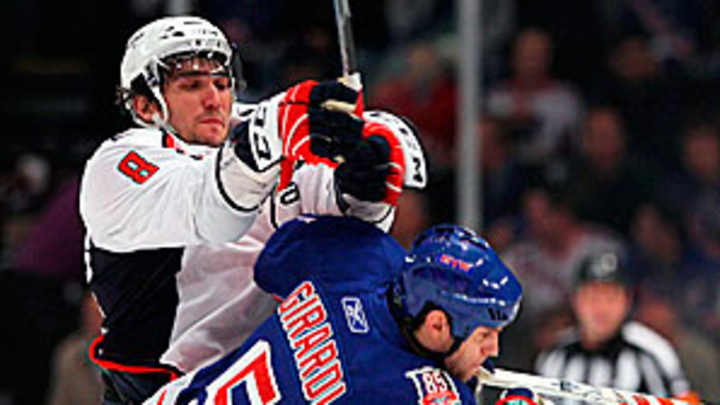Will the Rangers or Capitals have anything left to give?

Playoff hockey has always been more demanding physically. Never, however, has the game seen success tied so closely to shot-blocking, heavy-hitting and more shot-blocking. Hunter's managing of ice time minutes based on roles that are tied to game situations has raised eyebrows throughout the playoffs because Alex Ovechkin has not played much when the Capitals have the lead. Well, Game 6 proved that Ovechkin realizes what Hunter wants from all of his players all of the time, as he turned in a complete game -- under control and within the team structure. Ovechkin even blocked shots in a defensive posture and not in a blitz of the point man in hopes of having the puck carom off his shin pads and lead to a breakaway.
That type of commitment warrants ice time individually and leads to championships collectively. In a rare case of peer acknowledgement, the Blackhawks' Joel Quenneville commented that he can be a better coach -- that in watching these playoffs he realizes that he could reward his players' effort with ice time and not just award it based on their salary, status, or past performances. Certainly Hunter's handling of Ovechkin and Ovechkin's positive response factored into Coach Q's reflective assessment. And while blood-and-guts determination has always been held up as part of playoff glory, in a salary-capped league -- where flawed top teams compete more evenly than ever with bottom teams that have talent -- every small-detail sacrifice is crucial. These playoffs are proving that adherence to that principle from top to bottom is vital.
That's the physical part of this postseason, which has been compelling in a gladiators sort of way. On the mental side of the equation, I found it intriguing -- and almost predictable -- that the Philadelphia Flyers and Nashville Predators exited so meekly in the second round. Not because Philly's goalie seemed to sometimes reside on the planet Xanax, or because a couple of the Preds' key additions played Russian roulette with curfew. Rather, on a more fundamental level, those teams faced a letdown scenario.
Both played highly charged, emotional series in their respective conference quarterfinals against their most hated/revered rivals. The Flyers deposed the Pittsburgh Penguins in a rollicking and raucous series that defied logic. Three-goal leads weren't safe, penalty-killing was non-existent, and the goaltending had shift-to-shift swings from miraculous save to horrendous goal. It looked like 1982 all over again. Meanwhile, the Predators dispatched the Detroit Red Wings -- the franchise standard they've measured themselves against since Music City became Hockey Tonk in 1998 -- in workmanlike fashion. They knew Detroit's tendencies better than the Red Wings themselves did. The Preds were bigger, stronger and more diligent in every facet of the game.
Faced with some internal strife and up against focused, determined -- there's that theme again -- foes, though, neither the Flyers nor the Preds had the wherewithal to conjure up the emotion necessary against the New Jersey Devils and Phoenix Coyotes respectively. That's not surprising, given the mental capital they expended in their first round successes. Philly prides itself on forechecking opponents into oblivion. They did that to a beleaguered and bewildered Pens blue line. Against the Devils, the Flyers were in retreat. Their defensemen looked vexed and perplexed. The stars of the Devils -- Ilya Kovalchuk et al -- showed gumption and conviction, while Flyers' star and catalyst Claude Giroux sat by idly in the deciding game, convicted of a hit to the head and handed a one-game suspension. The Flyers fell flat, befuddled at times by the Devils' up-ice pressure.
For the Predators, things went sideways immediately in the west semifinals. A team long prideful of its defensive discipline suddenly couldn't defend. Unflappable goaltender Pekka Rinne looked rattled, or at least unsettled, and was bested by the exploits of counterpart Mike Smith at the other end. The high of realizing their Red Wings stamp of self-approval was quickly replaced by the reality of a 2-0 desert deficit. The Preds never recovered. The bodies were willing as always, but the collective mind of the group couldn't get back to puck pursuit nirvana. And the Coyotes pounced, opportunistically scoring enough to make their bend-but-don't break defense hold up.
Everyone enters the playoffs willing to do whatever it takes to win. More than ever, that seems to matter, with teams so close competitively. Sometimes, though, the mind does matter and it isn't simply mind over matter. Just ask the Flyers and the Predators. What the Capitals or Rangers have left to give after they get done doing their epic seven-game battle will surely be a key to the Eastern Conference Final.
